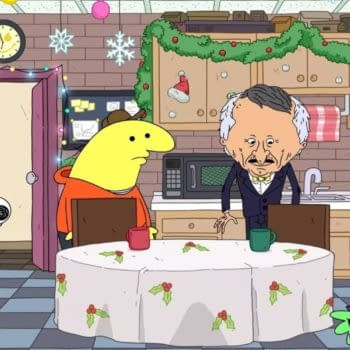Posted in: BBC, Doctor Who, TV | Tagged: doctor who, steven moffat
Doctor Who: Why Steven Moffat was The Show's Ultimate Showrunner
Steven Moffat was the longest-serving showrunner on Doctor Who, and his tenure resulted in some of the show's greatest (and messiest) moments.
Steven Moffat was the longest-serving showrunner for Doctor Who, having served for seven seasons. He created many classic monsters and moments in the series since Russell T. Davies' revival of the series in 2005, but he seemed to arouse as much controversy as praise just because he was there for so long.

Steven Moffat Created Some of Doctor Who's Greatest Moments
No other writer for Doctor Who created as many fan favourite classics as Moffat did: Matt Smith's young-but-old Eleventh Doctor, Peter Capaldi's morally conflicted and tragic Twelfth Doctor, Alex Kingston's River Song, Karen Gillen and Arthur Darvill as fan favourite companions Amy Pond, The Paternoster Gang, Jenna Coleman's Clara Oswald, Michelle Gomez' Missy, Pearl Mackie's Bill Potts. The most memorable villains he created were the Weeping Angels, though he created more high concept villains than any other writer like the Silence and several others but none have had the resonance orHe lasting power as the Angels. He explored as many nuances as possible he could find with the Daleks and the Cybermen he could think of, introducing pathos to Davros and the dimensions of the Doctor. He wrote many of the greatest episodes like "Don't Blink" (granted, this was under Davies' run as showrunner) and memorable stories under his run, including "Heaven Sent," one of the best variations of the Groundhog Day concept that was clever and a great allegory about the cycle of grief and mourning.
The Pressures of Showrunning
"Showrunner" is a relatively new concept to British television since most British TV series have shorter seasons and are frequently written by just one writer. Only soap operas have writers' rooms. Doctor Who has always had one head writer or story editor overseeing the season, outsourcing individual episodes to freelance writers invited to contribute to the show. The showrunner oversees the whole show and its scripts, including being responsible for the hires and casting, working with the producers and heads of department.
It's a high-pressure job dealing with both production and writing the scripts, not to mention supervising the freelance writers' individual contributions to the season. Davies and Moffat have both admitted that Doctor Who eats up story ideas, and the constant pressure to come up with new ones is enormous. Moffat has said he was often burned out and desperate for new ideas, which might explain the stories that fans were less enamored with. Needing to have stories and scripts written so that the show can be made results in every TV show having less-than-great stories with very few exceptions, including Doctor Who.

The Double-Edged Sword of Moffat's Legacy
Moffat is credited by fans for creating some of the greatest and some of the most convoluted moments from Doctor Who. It's that old adage of the hero sticking around for too long to end up getting considered a villain, but now that Moffat has left the series, his run is being looked upon with more fondness, especially after Chris Chibnall's run after his. He has written more episodes of the series than any writer, and now that he's back freelancing, there's less pressure so he can just create good one-off stories like "Boom," and fans have high hopes for his upcoming Christmas Special episode. Absence makes the heart grow fonder, and past sins are forgiven, especially when there's joy to remember.














